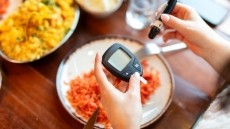Omega-3 eggs' heart benefits get clinical trial boost
triglyceride levels, boost heart health, and help people reach
their omega-3 recommended intakes, says a study from Canada.
"Egg products can serve as ideal functional foods for the dietary delivery of the cardioprotective omega-3 fatty acids (EPA/DHA) since the US population consumes relatively high levels of eggs, which are also rich sources of various other important nutrients, including essential amino acids, vitamins, etc," wrote lead author Emily Rose in the journal Food Research International (Vol. 39, pp. 910-916).
Eggs enriched with omega-3 fatty acids are not a new idea, with commercially available products on both sides of the Atlantic. Along with kelp and flax seed, chickens that lay low-fat eggs are fed canola oil or other types of non-animal fats. Hens raised on this special diet produce eggs with lower saturated fat that are fortified with omega-3 fatty acid, iodine and vitamin E.
And by adding such eggs to the diet, said Rose and her co-researcher Bruce Holub from the University of Guelph, could be a sensible way of meeting the omega-3 shortfall currently observed in many populations.
Indeed, increased consumer awareness of such products has seen UK egg consumption rise, with sales up 10 per cent during 1999-2003, according to Mintel. But value sales have increased by double this amount, some 23 per cent during the same period, due to consumers trading up to premium egg varieties, particularly omega-3 enriched eggs.
The current recommended intake of very long-chain omega-3 polyunsaturated fatty acids (PUFA) in the UK is 450mg per day. Yet on the basis of food consumption surveys, researchers estimate that the current mean intake amongst adults is only 282 mg per day, of which EPA and DHA contribute 244mg.
Omega-3 has been studied extensively for its potential to decrease the risk of cardiovascular disease. CVD causes almost 50 per cent of deaths in Europe, and is reported to cost the EU economy an estimated €169bn ($202bn) per year.
Since only about 27 per cent of adults actually eat any oily fish, and that alpha linolenic acid, from plant sources like flaxseed, are poorly converted in humans, researchers have begun to focus on alternative sources to increase omega-3 intake in the general population.
Rose and Holub recruited 16 healthy men with moderately elevated levels of the triglycerides in the blood (greater than 88.5 milligrams per decilitre of serum), said to be a risk factor for CVD. The men were randomly assigned to one of two periods to eat a liquid egg breakfast enriched with omega-3 or a control breakfast for 21 days, followed by a ten day washout period, and then crossing over to the other breakfast.
The liquid egg breakfast (Break Free Omega-3, Burnbrae Farms, which also partly funded the research) provided 0.63g per day of EPA and 0.64g per day of DHA, while the control breakfast provided 0.013g per day of EPA plus DHA.
At the end of each period, blood samples were taken and the researchers found that eating the egg breakfast decreased triglyceride levels by 53.1 milligrams per decilitre (mg/dL). The control breakfast led to a reduction of 25.4 mg/dL. The ration of triglycerides to HDL-cholesterol also improved due to the egg breakfast (decrease of 1.42 mg/dL) compared to the control breakfast (decrease of 0.76 mg/dL).
It has been reported that a one millimoles per litre (mmol/L) increase in blood levels of triglycerides can increase the risk of CVD by 76 per cent in women and 32 per cent in men. The decreases observed in this study are equivalent to 0.6 mmol/L for the egg breakfast, and 0.29 mmol/L for the control breakfast.
Levels of LDL-cholesterol increased for the egg breakfast group, while this type of cholesterol decreased for the control breakfast.
Blood levels of EPA and DHA significantly improved as a result of eating the egg breakfast for 21 days, with increases of 0.32 and 2.36 mg/dL, respectively. Levels actually decreased as a result of the control diet.
"The liquid egg product as used herein provided 1.3 g/day of EPA and DHA, as a breakfast food, in 240 kcal, which represented approximately 10 per cent of the total daily caloric intake. The EPA/DHA content per 100 g in the liquid egg product, as consumed without reports of fishy taste, is significantly higher than that for many types of fish, including tuna, halibut, cod," reported Rose and Holub.
"This human study indicates the potential for a functional food (liquid egg) containing fish-derived EPA/DHA to favourably influence multiple risk factors for cardiovascular disease," concluded the researchers.
Previous studies have reported that starting the day with an egg breakfast could increases satiety in overweight and obese people, and could lead to weight-loss.
Eggs are well known to have a 50 per cent higher satiety index than regular breakfast cereals, which is generally believed to be due to the high protein content of the eggs.
Mintel estimates suggest that per capita egg consumption has risen from 1.46 per person per week in 1999 to 1.58 in 2003, with consumers spending almost 19 pence per person (including children) per week on shell eggs.












